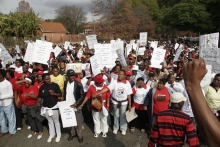Although the number of people employed in South Africa has increased in the last 10 to 15 years, its unemployment rate remains dismally high by international standards. For example, in the second quarter of 2013, the national unemployment rate was 25.6% and that of Gauteng was 25.0%.
Apart from a low rate of economic growth, unemployment has also been blamed on the nature of labour market institutions in the country. Views and preferences of labour unions (especially the Congress of South African Trade Unions or COSATU) and big business have dominated the process of consultation and decision-making in government with respect to the formulation of labour market policies * .






